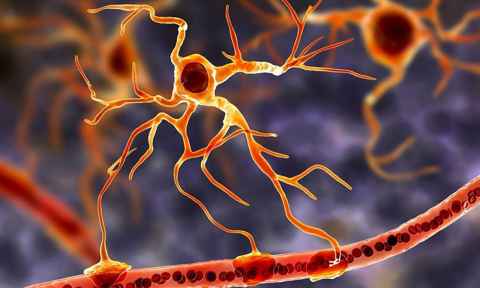Brain blood flow discovery holds clue to dementia, hypertension, migraines
14 January 2020
Scientists have made the remarkable discovery that the brain has its own blood pressure sensors, opening the way to new possible treatments for dementia, high blood pressure, migraines and other conditions.

For decades, scientists have suspected that the brain had a way of monitoring and regulating its own blood flow separate from the body-wide blood pressure control system, but until now no one had proven this. The brain needs more blood than any other organ to satisfy neurons’ relentless, high demand for oxygen, so it makes sense that it would have a way of buffering itself from blood flow fluctuations in the wider body.
Now, a research collaboration involving scientists from the University of Auckland, University College London, and Bristol University is the first ever to identify blood flow sensors within the brain. In the researchers’ animal study they found the sensors, tiny cells called astrocytes, strategically squeezed between blood vessels and nerve cells in rats’ brains. When the researchers stimulated these cells, the cells increased blood flow into the brain.
What we have discovered is that the brain has an automatic way to make sure brain blood flow is preserved. Unfortunately ... this can happen at the expense of generating higher blood pressure in the rest of the body.
Professor Julian Paton from the University of Auckland’s Faculty of Medical and Health Sciences, a member of the research team, explains: “These astrocyte cells are exquisitely sensitive to reductions in brain blood flow. When blood supply is reduced, they release a chemical signal to nearby nerve cells that raise blood pressure, restoring blood flow to the brain."
The researchers say this finding could potentially lead to new approaches to treating numerous diseases associated with reduced brain blood flow. Disturbances to brain blood flow are a known cause in many diseases; for example, sustained reduction in brain blood flow is a likely cause of cognitive decline, dementia, and neurodegenerative disease such as Alzheimer’s Disease.
“What we have discovered is that the brain has an automatic way to make sure that brain blood flow is preserved. Unfortunately, in pathological conditions, this is happening at the expense of generating higher blood pressure in the rest of the body," says Professor Paton.

“Our finding suggests that reducing activity in these blood flow-sensing astrocytes may be a way to lower blood pressure in people with hypertension (high blood pressure). It may also be a way to combat migraines and strokes. On the other hand, sensitising these cells may help in conditions of dementia to improve brain blood flow.”
Collaborator Professor Alexander Gourine from University College London says: “We are very excited about this discovery; there has never been a formal description of a blood flow or blood pressure sensor within the brain before. Our new data identify astrocytes as brain blood flow sensors that are critically important for setting the normal level of systemic (arterial) blood pressure and in doing so ensures that the brain receives a sufficient amount of oxygen and nutrients to support the uninterrupted operation of the information processing machinery.”
The study was published in the prestigious scientific journal Nature Communications.
Read the article:
Nature Communications: Astrocytes monitor cerebral perfusion and control systemic circulation to maintain brain blood flow
Media contact
Nicola Shepheard | Media adviser
DDI: 09 923 1515
Mob: 027 537 1319
Email: n.shepheard@auckland.ac.nz